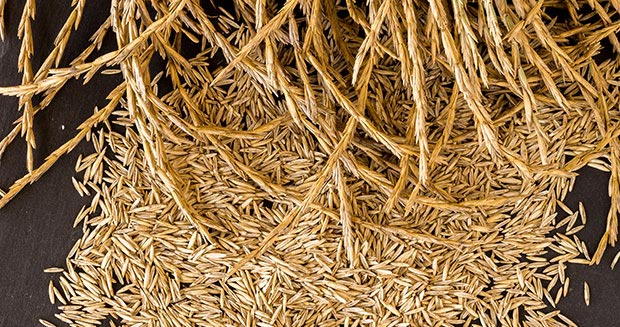Kansas-based The Land Institute recently announced a partnership with Cascadian Farm, a pioneer in the organic food movement, and parent company General Mills to help commercialize the institute’s Kernza perennial grain.
Kernza wheatgrass was developed by The Land Institute to help address the growing problems of soil erosion, greenhouse gas pollution, groundwater depletion, fertilizer runoff, and other negative impacts of industrialized annual crops. Perennials like Kernza are deep-rooted plants that may be grown year after year with minimal tilling, fertilizers, fossil fuels, and pesticides while using water more efficiently than annual crops and rebuilding healthy soil.
As part of The Land Institute’s vision for a truly sustainable food system, Kernza perennial grain grown in polyculture mixtures may soon offer more farmers an alternative to industrial agricultural methods.
Cascadian Farm has agreed to purchase an initial amount of the perennial grain for use in organic products, providing a buyer at a volume that allows growers to plant on commercial-scale fields versus the test sized plots currently under production.
“We are excited to incorporate the perennial grain Kernza into our foods and our organic farming,” said Carla Vernón, vice president of Cascadian Farm. “We believe in the potential of this grain to make a positive ecological impact.”
Cascadian Farm has also reserved an initial amount of Kernza perennial grain seed and plants to plant an acre test plot this fall on the Cascadian Farm home farm next to the Skagit River in Washington. The farm team will closely monitor and research how the grain fares in the unique temperate rainforest ecosystem in partnership with The Land Institute.
In addition, General Mills approved a $500,000 charitable contribution to the partnership of The Land Institute and the Forever Green Initiative at the University of Minnesota to support advanced research to measure the potential of Kernza to reduce greenhouse gas emissions associated with food production, determine best management practices for sustainable production, and increase yields through breeding.
“Research has demonstrated that the ecological benefits of Kernza perennial grain for agricultural systems are remarkable,” said Dr. Lee DeHaan, lead scientist at The Land Institute. “The length, size, and long life of the roots enable the grain to provide measurable soil health benefits and drought resistance while preventing soil erosion and storing critical nutrients—potentially turning agriculture into a soil-forming ecosystem.
“This partnership with General Mills and investment by Cascadian Farm, promises to be a significant boost, helping take this planet-friendly grain to the next level of viability as a food ingredient. Additionally we anticipate it will allow researchers to more precisely measure the impact of widespread Kernza perennial grain cultivation on carbon sequestration.”
Since 2014, General Mills has worked with The Land Institute and University of Minnesota’s College of Food, Agricultural & Natural Resource Sciences to research the viability of Kernza intermediate wheatgrass as an earth-friendly, more sustainable grain.
Cascadian Farm/General Mills joins Patagonia Provisions, Hopworks Brewery and a growing group of culinary leaders and innovators using Kernza perennial grain in beverages, baked goods, side dishes, desserts, and more. These leaders include Tracy Singleton, owner of the Birchwood Café and Jeff Casper of Dumpling and Strand in Minneapolis/St. Paul, Minnesota; Zachary Golper at Bien Cuit in Brooklyn, New York; and Karen Leibowitz and Anthony Myint, co-founders of The Perennial in San Francisco, California.





